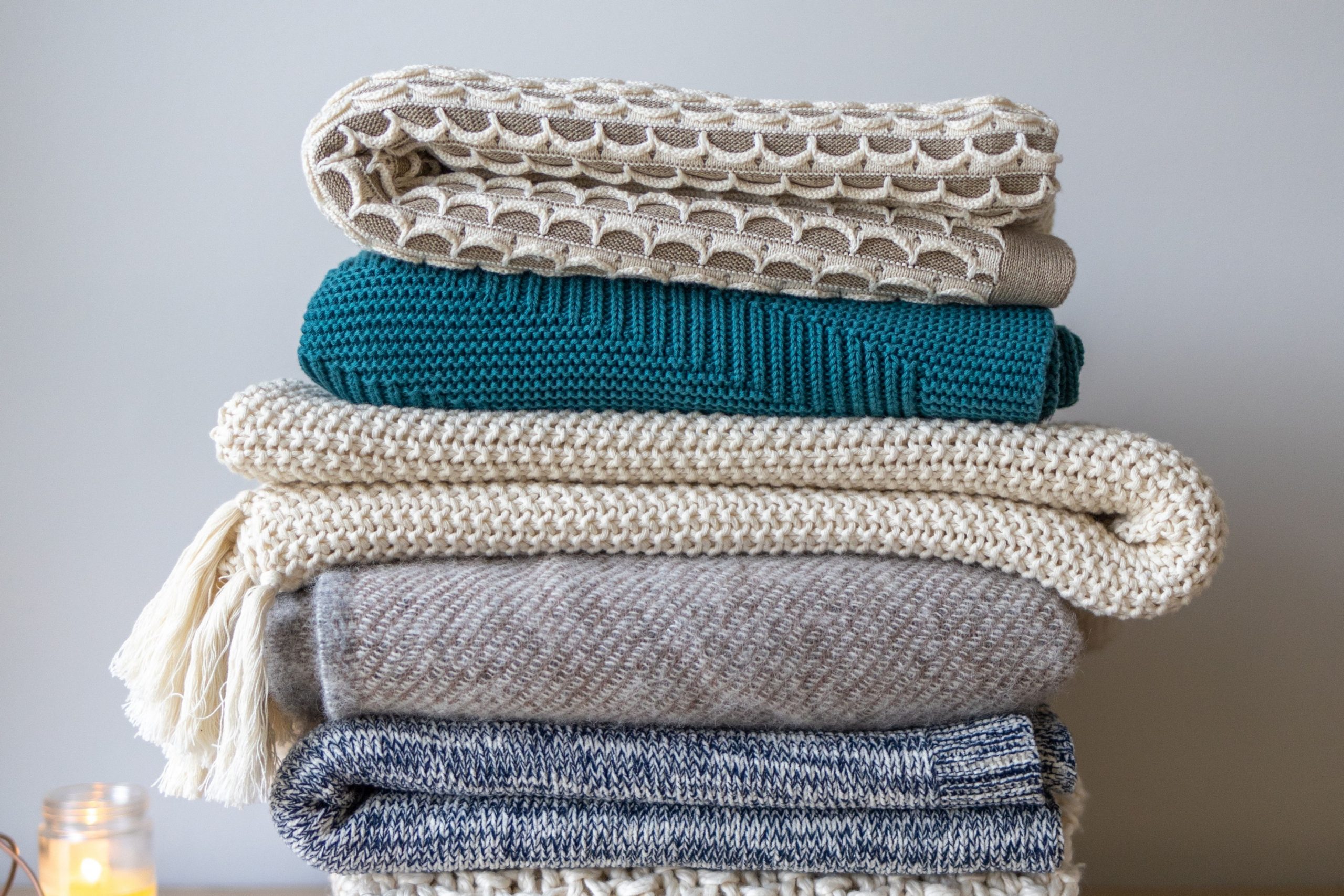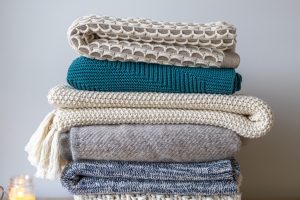Part of our brains still believe we live in dangerous caves in the wild, craving our safety. If you suffer from anxiety or chronic insomnia, then that primal feeling of “hiding in a nest” may be precisely what you are missing.
So, should you build a new blanket fort in your bedroom? That sounds like a quirky weekend adventure, but it’s not practical daily. However, weighted blankets could potentially help reduce your anxiety and stress. Read on to learn more about weighted blanket benefits.
Weighted Blanket Benefits: Real or Fake?
Weighted blankets are heavy quilts filled with tiny glass beads or plastic pellets, making them significantly heavier. They can weigh between 5 and 30 pounds, depending on the size and quality.
How do weighted blankets work?
Weighted blankets provide deep pressure stimulation or a gentle heaviness around your body. Neurologists believe deep pressure stimulation can relieve anxiety, block other sensory stimulation (such as background noise or shimmering lights), and contribute to more restful sleep.
Weighted blankets are not a new concept – but they have risen in popularity significantly after 2017. Before that, they were primarily used for children with an autism spectrum disorder or other neurodevelopmental problems. When they are overstimulated, a weighted blanket can offer autistic children a haven where they can decompress, preventing a meltdown.
The same concept applies to adults with anxiety and panic disorder, or even with stress – after all, what is chronic stress but permanently on guard from unseen, ever-lurking threats?
Have weighted blankets been tested?
Weighted blankets are difficult to test. It is challenging to have a proper “blind” control group, as participants can immediately tell whether they are given a weighted blanket or a regular one. We have decades of clinical experience using them on psychiatric wards, plus several smaller studies offering promising results.
The effectiveness of weight blankets may not be universal. Still, on a routine basis, at least 60% of people with insomnia or panic disorder experienced better sleep after using a weighted blanket for at least 5 minutes.
A different study conducted on children with hyperactivity and autism spectrum disorder found that weighted blankets could improve sleep and lower anxiety levels during the following day.
And if you are driving yourself ragged counting sheep for hours on end, it is worth a try!
Should I Invest in A Weighted Blanket?
Deep pressure stimulation (and, by extension, weighted blankets) can help people with any of the following conditions:
- Generalized anxiety
- Post-traumatic stress disorder
- Depression
- Panic disorder
- Autism spectrum disorders
- Burnout
In these cases, a weighted blanket can help lower anxiety and slow your heart rate after just five minutes. Sleeping under a weighted blanket will help you fall asleep faster and improve the quality of your sleep. On winter nights, some models can also provide some extra warmth.
However, they are far from a universal cure. The extra weight can get too hot or uncomfortable (although some models include a layer of cooling gel).
In addition, some people may find deep pressure uncomfortable or triggering. Check with a doctor before buying a weighted blanket if you have any of the following conditions:
- Sleep apnea
- Claustrophobia
- Asthma
- Emphysema or other respiratory problems
How to Choose the Right Weighted Blanket
Thanks to their increased popularity, weighted blankets are now available in a much larger variety of models. They remain significantly more expensive than regular quilts, starting at around $30, but can easily surpass $150.
Before making such an investment, it’s best to research the right type of weighted blanket for you. Consider the following features:
Weight
To work, the blanket should weigh at least 10% of your body weight. More is not always better, as going above 15% can make it feel too constrictive.
Cover material
Some weighted blankets use a similar synthetic material as duvets. This is great as long as the cover is removable, making it easy to wash, dry, and reuse. Others use cotton, fleece, or even bamboo fabric. These materials may be cooler and softer on your skin, but they require you to dry-clean the blanket.
Weight distribution
Quality weighted blankets should have a series of small inner pockets around their cover, preventing the inner beads or shards from shifting around during use. Otherwise, you may end up with an overly heavy blanket on one side – and a very expensive duvet on the other.
Some newer models now replace the layer of beads with a line of heavier weights around the blanket’s edges. The idea is that gravity will pull the edges down and replicate the pressure while keeping the total weight lower. Remember that these models only work if you have a raised bed: the blanket edges must hang from the sides.
Filling material
Weighted blankets are usually filled with either glass or plastic pellets. Plastic pellets are generally cheaper but lighter than glass beads. As a result, plastic-filled blankets are usually thicker than glass ones of the same weight rating.
Temperature options
If you live in a warm region or don’t have A/C at home, weighted blankets can quickly create a sauna beneath them. Some models counter this by adding a cooling gel layer to the blanket’s bottom side.
Weighted Blanket Benefits for Anxiety and Stress?
Anxiety and stress are common parts of modern living. Weighted blankets can make a difference if your worries and racing thoughts get in the way of your sleep. They will work much better if combined with a more holistic mental health awareness plan. Outdoor exercise, mindfulness exercises, and talk therapy will also help create a solid foundation for inner serenity.
Think differently about your health with Society of Wellness. Get your free health assessment here.
Image Credit: Photo by Jordan Bigelow on Unsplash





